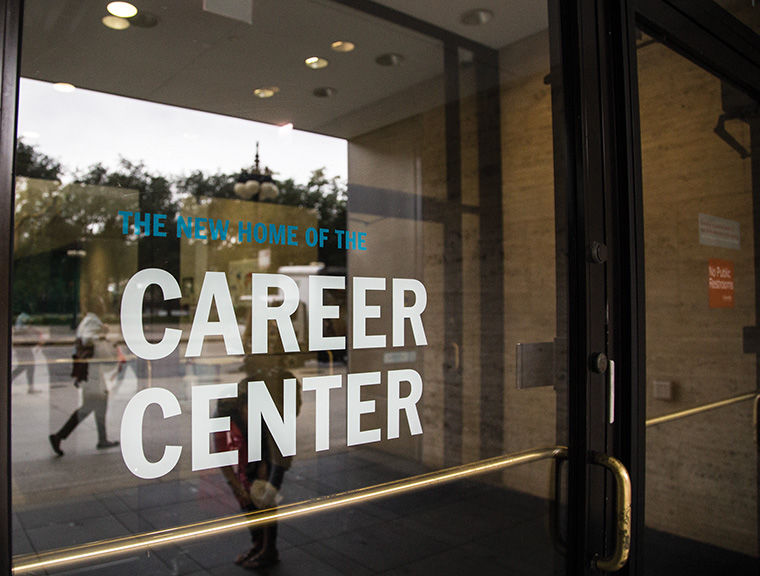Internship and career advisers address new positions, increased workload
Columbia’s internship and career advisers will now be housed in the Career Center and overseeing several majors and departments, according to Erik Friedman, associate dean of Career Development and Industry Relations.
September 26, 2016
At Columbia’s newly merged Career Center, as reported Feb. 15 by The Chronicle, the college’s internship coordinators now hold positions as internship and career advisers and work in a new location at Columbia’s 618 S. Michigan Ave. Building.
With these roles come more responsibility for past coordinators Tom Joyce, Jennifer Halperin, Aundrea Parsons and Lyn Pusztai, and new hires Sarah Butler and Jo-Nell Sieren. Instead of covering one major as they did in the past, some advisers now cover several, according to Associate Dean of Career Development and Industry Relations Erik Friedman.
After being contacted several times by The Chronicle, Halperin and Parsons were not made available for comment and Pusztai and Butler declined to comment.
“Taking on additional majors, it’s a workload for the advisers,” Friedman said. “They’ll have to figure out how to manage that and how to develop [and] maintain those relationships and work with students.”
Joyce, a current internship and career adviser, worked in the Radio Department as the internship coordinator prior to his new positions at the Career Center.
Now, Joyce works as an adviser for the Radio, Audio Arts & Acoustics, Business & Entrepreneurship, and Science & Mathematics departments. He said this change provides him the opportunity to work with more students, college-wide.
“The thing I took pride in [as internship coordinator] is that I was able to cultivate one-on-one relationships with the students and that would lead to opportunities for them through internships or job leads,” Joyce said.
CaSera Heining, senior radio major, said Joyce was always available when she needed him when located in the Radio Department, acting as a mentor for her throughout her time at Columbia.
“He was always there, whether it was finding an internship, an issue I had with a current internship, worried about finding an internship, or if something was unfair in the department,” Heining said.
According to the most recent official registration report for Columbia’s Fall 2015 semester, Joyce is now working with a group that encompassed approximately 1,500 students in 2015 across four departments, a drastic leap from the 85 radio students he advised last year.
The number of students in Halperin’s allotted departments was approximately 1,000 in 2015, as opposed to the 350 she advised last year. Parsons’ departments had 960 in 2015, Lusztai approximately 1,500, Sieren approximately 1,750 and Butler approximately 1,610, according to the 2015 report. 2016’s official enrollment report has not yet been disclosed by the college.
Mackenzie O’Connor, junior journalism major, said assistance from her internship and career advisor, Halperin, has remained the same,except their form of communication is now different.
“Last year I would just go into [Halperin’s] office if I had a question…[This semester] I have worked with Halperin indirectly,” O’Connor said.
Joyce said he plans to properly serve his students and departments, new and old.
According to Joyce, the changes force advisers to manage their time. Meetings that might have ran an hour or longer in the past may be shortened to 10–15 minutes.
“With more students coming our way, some people might think, ‘Oh, there’s not too much time in the day,’ but I’m always going to find time and my cohorts feel the same way,” Joyce said. “We’re going to make sure that every student is taken care of.”
It is the advisers’ responsibility to learn about their new departments and their needs to help all students, Friedman said.
“Being knowledgeable on more than one department is advantageous,” Friedman said, adding that if an adviser is struggling to provide the right services, they have a team at the Career Center to help them.
Friedman said he is open to hiring more advisers if needed.
“This is our first semester,” Friedman said. “We’ll see how it goes and if we need to change things along the way, we’re OK with that.”
Jo-Nell Sieren, internship and career adviser for the Photography, Design, Interactive Arts & Media and Art & Art History departments, said she is happy with her new position after coming from the photography department, where there was not a large internship program.
“I saw a need for guidance in students putting their portfolio together, their resume, the interview process, actually having internships [and] relevant experience to get the career they want,” Sieren said.
Columbia Works, powered by Handshake, is a more convenient way for students to set up appointments, said Friedman. Appointments are still accepted via email or walk-in, depending on the adviser.
Columbia’s goal is providing internships to all students, according to Senior Vice President and Provost Stan Wearden, who announced the goal during this year’s Staff and Faculty Convocation Sept. 16, as reported Sept. 19 by The Chronicle.
Joyce added that with the new Career Center, the college is on track for meeting that goal.
“We want [students] to be really strong candidates and to feel empowered and to feel like they can do whatever they want. I think by being together as a team, this has really helped that process,” Joyce said.
Heining said Columbia should have left advisers in their respected departments in order to maintain a good relationship between them and their students.
“I can’t just walk into [my adviser’s] office, I [now] have to call him or email him, wait for a response,” Heining said. “All that delayed time could delay me from something great.”








